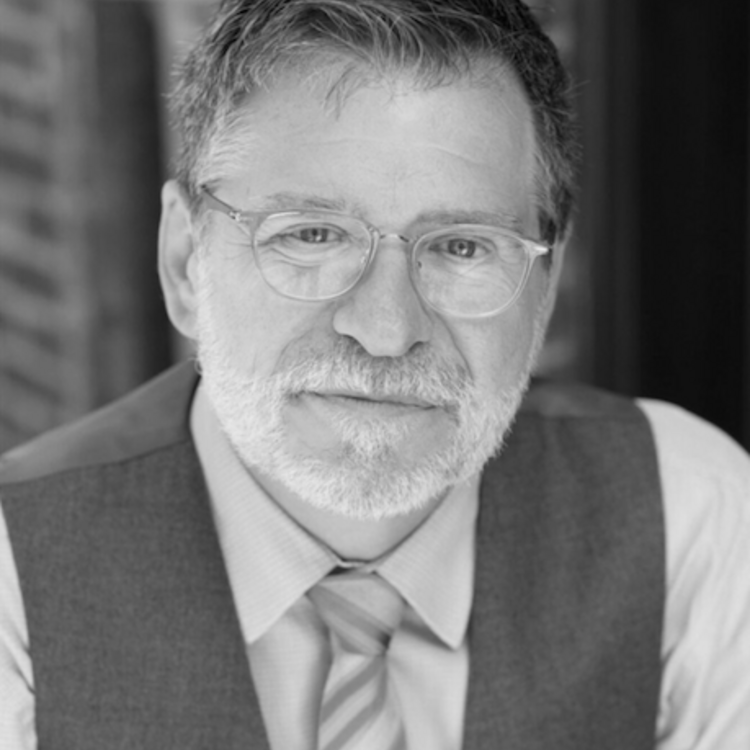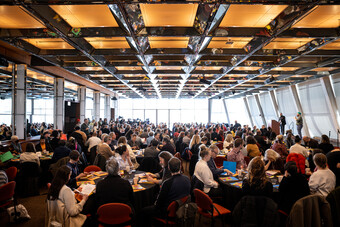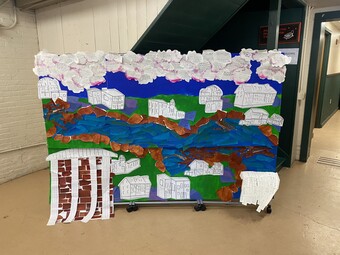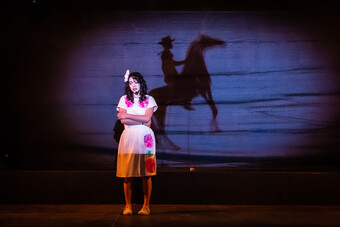Practical Applications of the Culture Coin
Imagine the vast wealth of the field now tied up in Endowments could be released to circulate as part of the common wealth of the culture sector without destabilizing the financial health of the endowed institution.
Imagine some percentage of the common wealth of the culture sector tied up in buildings could be recirculated in the community as access and expertise.
Imagine that cash-strapped ensembles, small producers, and artists could acquire some percentage of this restored value and trade it amongst themselves for cultural goods and services.
What could we do, make, dream then?
This vision not making practical sense yet? Here’s a suggestion—follow the money:
Say donors put one million in cash into the cultural economy for a building or endowment, rather than into a show or an annual fund. This becomes a resource removed from circulation.
To get it recirculating, the theater then puts a percentage of that donation into the Culture Coin economy—let's say even 10% of the cash value each year, or $100,000 in Culture Coin for every million in the lock box.
They distribute it via:
- 500 hours of shop rental available during unscheduled time, to be purchased with Culture Coin currency.
- 10% of seats available only through Culture Coin exchange so that culture workers can engage the art.
- 500 hours of rehearsal space available during unscheduled time in studios.
- Eight weeks of theater space available for an itinerant ensemble/company during unscheduled times.
- As donations to companies and artists they want to support.
- As a donation to a community currency bank, like a Theatre Bay Area or TCG to be regranted.
These resources are all available now for purchase with Culture Coin.
Now imagine artists, ensembles, and small organizations acquire Culture Coin purchasing power through un/underpaid activities in the cultural community.
- Do a 29-hour reading and get the cash fee plus equivalent Culture Coin supplement to make the wage more respectable—paying the "sweat equity" portion in Culture Coin.
- Volunteer as a script reader, usher, or performer at a benefit, get compensated with Culture Coin.
- Direct, produce, perform, design, tech a project for a small company (even your own) where cash is not available for compensation and get paid in Culture Coin granted to the project from your community CC (Culture Coin) bank. (Theatre Bay Area, StageSource, etc.)
Donate time to managing, marketing, fundraising, teaching, etc. for your small company and get paid in Culture Coins.
Culture Coin has no cash value, so it can't pay your rent, buy your groceries, or buy gas. That problem will not be solved by this project. But we can begin to make a dent in the challenges within the cultural economy—like access to the work, the spaces, the expertise, and the audience for those currently locked out by the shortage of cash.
But once the Culture Coin bank opened, things began to change. Now the small companies could purchase things like goods and services in the cultural sector with Culture Coins, instead of cash, and save the cash to pay the artists and the bills. Rehearsal space, for instance, and shop space. They could hire part time management and financial support with the currency.
There are lots of reasons not to try this. I will leave it to other stakeholders to articulate them. "The devil,” my grandmother used to say, "has plenty of advocates, David. You can serve just as well on the side of the angels." The doubting and questioning will be an important contribution to the creative process. So, too, will tenacity and creativity around problem-solving how to better quantify creative sweat equity.
A Story
Once upon a time there was a huge theater in a bustling cultural community. They built themselves a wonderful home, filled with rehearsal studios, theaters, tools for making sets and costumes, classrooms for education programs, and beautiful spaces for public events. The building was paid for by their loyal donors and with remarkably complicated financing and tax structures that sheltered them from the for-profit cash economy and made it affordable on their budget. They also asked their generous donors to help ensure their long-term financial stability with additional cash donations to their endowment campaign. They were successful on all fronts and had a magnificent facility floated by a robust endowment prudently invested in the global economy.
Not content to rest on their lovely laurels, they set about to see how they could share their good fortune with their entire community. They turned to a Complementary Community Currency program called Culture Coin for help. They first inventoried all their under-utilized, and therefore under-leveraged, cultural resources. They had dark weeks on their stages. They had hours where their rehearsal studios, classrooms, public spaces, and shops stood empty. They had seats their budget didn't anticipate selling that could be contributed to the community's resource bank. They even had desk space and some volunteer hours among their most experienced employees that they felt they could put into the local cultural economy. And space on their web server. Oh, and acres of wall space that could serve as gallery space. And a huge warehouse full of props, costumes, and equipment.
From all of these resources they first subtracted the amount they would need to monetize through cash exchange: rentals for weddings, corporate parties, dynamically-priced seats to blockbuster box office hits, theater rentals, and enhancement deals that balanced their operating budgets. And still there were significant resources to recirculate through the cultural economy. They added it all up and deposited it in the local Culture Coin bank, committed to making these resources available should anyone come to them with sufficient CC to acquire them. They we're joined there by other cultural organizations with under-leveraged resources: the symphony in their town, the performing parts palace, the museum, and the opera. Even the small and midsized cultural organizations did their inventory and found resources to convert to the cultural economy that would not destabilize their fiscal health. And they made their deposits accordingly. This community's Culture Coin coffers were stuffed!
Meanwhile, the community's artists were busy as bees making work. At first the work suffered, quite often, because they were trying to create it with cash, which they had little of, supplemented by sweat equity, which was a non-renewable and highly volatile currency. The moment someone got a better paid gig or bigger opportunity they had to take it. And they could only participate in the hours that were available to them from their cash-producing jobs. The result was churn and burnout for everyone, with wildly uneven artistic results and limited civic impact. They struggled for audiences and visibility that could only be purchased with cash.
But once the Culture Coin bank opened, things began to change. Now the small companies could purchase things like goods and services in the cultural sector with Culture Coins, instead of cash, and save the cash to pay the artists and the bills. Rehearsal space, for instance, and shop space. They could hire part time management and financial support with the currency. (Purchasing the hours placed in the market by their colleagues in the larger organizations with the stable salaries.) They could rent props and costumes with it, and purchase audience data and lists to build their fan base. They even found they could barter their Culture Coins outside the cultural economy. One enterprising ensemble traded Culture Coins for audience members' frequent flyer miles and was able to get their show to the big Fringe Festival where they were picked up for a nationwide tour. The audience members then used their Culture Coins to purchase seats to the big theater's annual holiday production that they thoroughly enjoyed.
And at the big theaters, the Culture Coin exchange brought them much joy as they had landed on a means of comfortably engaging their community. With the Culture Coins that were paid to them for space, or tickets, or expertise, they complemented the cash component of their developmental processes and enhanced the cash compensation for teaching artists and volunteers. They donated Culture Coins to their favorite local companies and artists, and even returned some to the community bank to be recirculated. One enterprising company donated its Culture Coins to a community service nonprofit to provide access to tickets for their clients who got to see a play, an opera, and a holiday dance event around town—many for the first time ever.
As the Culture Coin circulated and grew in this community they realized they could actually branch out beyond their own borders and their CC Bank began depositing coin in the national CC Bank, which shared the wealth even more widely. Now communities and artists without big institutions and buildings could also stimulate their cultural economies with the currency. Now artists in these communities were suddenly able to participate in the cultural economy both locally and nationally—produce at home or travel to festivals, bring new expertise or share their own. Geography and status were no longer the arbiters of quality and impact.
Word of this success spread quickly to other sectors of the culture economy and to communities all over the world. Within a single generation, Culture Coin unlocked billions of dollars in stored wealth of the cultural commons and art flourished around the globe. A time of peace and neighborliness reigned and, together, the artists, audiences, and institutions of the world solved the challenge of sustainable harmonious life on our planet.










Comments
The article is just the start of the conversation—we want to know what you think about this subject, too! HowlRound is a space for knowledge-sharing, and we welcome spirited, thoughtful, and on-topic dialogue. Find our full comments policy here
As a long-time advocate of alternative/community currencies I'd like to make a few points:
1) You don't need money (such as a part of an endowment) to create "Culture Coins".
While cashing in ten percent of an endowment in order to buy needed products or services may be a good thing, it is an entirely different matter than creating an alternative currency such as "Culture Coins" because...
2) "Culture Coins", like dollar bills, have no intrinsic value; they are simply a medium of exchange.
A dollar bill is just a small piece of paper with a little ink on it, virtually worthless. We accept them in payment only because we know others are required to accept them as well. (That is, a person selling a good or his/her time can specify how many dollars it will cost, but he or she cannot refuse payment in dollars and instead insist on, for instance, gold or silver.)
3) Governments get people to use their currency via FORCE; alternative currencies require MUTUAL TRUST.
Think about it: If everyone in a community was completely trustworthy, everyone could just give (or redeem) IOUs when buying products or services. And in time these IOU's would become currency, as people paid each other back indirectly via the skills that they do best.
("Hey John, I'll fix your roof now if at harvest time you tell Jane to give me thirty percent of the vegetables she owes you for the fertilizer you gave her back when she was planting.")
4) In my opinion far too many audiences (especially at small theaters) already rely too much on fellow theater people and not enough on "regular" people.
And if you don't take steps to avoid it Culture Coins will only serve to further isolate the theater/arts community from society at large. (For instance, to use the core example given by David Dower, by encouraging one to pay for a theater ticket by hosting a staged reading.)
What is needed is an alternative currency system that is designed from the beginning (not as an afterthought) to facilitate, say, an organic farmer paying for a theater ticket with vegetables rather than dollars.
Remember, in the end it all comes down to trade (or barter): A currency system is simply a means to facilitate it. And what most of us (theater people and other artists) need is not more over-exposed insiders at our performances or readings, but more regular people... both for the benefit of their souls and our rent.
5) Economics is not intrinsically complicated; it is only made so by those who want to make their living off of currency manipulations (rather than by doing something productive) or by justifying the government manipulation of currency to benefit certain people at the expense of others. (And, as a certain so-called economist recently proved, if you are REALLY good at fooling people you can even get a Pulitizer Prize!)
Again, just remember the obvious (but so often overlooked) fact that dollars have no intrinsic value. (At one time they were worth a certain amount of gold or silver, but that ended decades ago.) It is simply the legal requirement that they be accepted that causes people to "trust" them.
Thus anyone who has something to sell (including their time, as in the case of a job) figures out (based on how many dollars it costs to buy other things) how many dollars per hour (or task) they should (ideally) be paid. Thus dollars are simply a form of trade; a more efficient (and divisible) form than barter.
Thus (since the bills have no intrinsic value) one can create an alternative currency system without any endowment. In fact, in a sense it HAS to be without it, otherwise you are just pretending to accomplish something (by first converting the endowment dollars into Culture Coins) before spending them. (In which case the only thing being accomplished is restricting what the artists who receive the endowment dollars can spend it on. But since artists are usually in greater need of food and rent money than most this arguably is not a good thing.)
Think of it this way: I could do something for an acquaintance and he or she gives me a ten dollar bill. But rather than spend it on food, the next week he does something for me and I pay him with the $10 bill. Same thing goes on week after week, such that eventually the $10 bill has changed hands dozens of times in exchange for dozens of hours of each of our time. Now the exact same thing could have been accomplished with a single IOU from my acquaintance, rather than the $10 bill... making the IOU a form of alternative currency, created out of thin air! The only thing that is required is trust.
So to create a new currency, all that is required is for one to write an I.O.U. -- DENOMINATED IN HOURS (or fraction thereof) of YOUR TIME -- whenever somebody does something for you.
Then at some future time this person -- OR SOMEBODY ELSE THEY HAVE "paid" using your IOU (!!!) -- can redeem this IOU for an hour (or whatever denomination) of your time. (Your IOU may specify the types of work you are willing to do… theatrical, unskilled, or whatever… or may specify so many organic vegetables or some other product instead of time.)
Of course at first only people you know personally and trust you will take your currency (IOUs). But over the course of time, as you become more well known in your community (can be trusted to redeem the IOU with quality time), others will start to use them as well. At which point your IOUs (as well as those by others who have gained trust), will become used as currency.
Now all this may seem weird, but it is basically how money (when simple barter was no longer sufficient) began (with gold and silver backing eventually allowing trade between more distant parties that had little reason to trust each other). Alas, eventually people were duped into thinking they were better off having the government control the money system -- which always leads to massive inflation as politicians increase the money supply to temporarily make things seem better before prices rise (and then claim that the rise in prices is due to some mysterious, unavoidable thing called "inflation").
The most important thing to remember (in my opinion) is that the goal of an alternative currency system should be to get "regular" people to trade their time (or products) for theater tickets, rather than further isolate theater people from the community through monetary inbreeding.
(Polly: If you think it would be helpful, feel free to put a link to that brief screenplay excerpt of mine I sent you. I think it's a good visual explanation for how such currencies would work. (The main character, new to the community, is being told why they don't use dollars.)
I hope the above (admittedly long) comment has been helpful. If not, feel free to ignore it. In either case, I think what will eventually be discovered is that the fundamental problem isn't the need for an alternative currency system, but the fact that there is such a disconnect between what we want as consumers and what we want to do for a living. Most people these days don't produce the things we want, whether it be cars, clothes, gas, or (especially) hi-tech TVs, stereos, cell phones, ipads, etc. These are all made overseas while so many americans are unemployed (or do "make work" that provides no real value, such as count how many people are unemployed).
This is a far larger issue... the causes of (and solution to) one which I'd be happy to write about if desired, but this comment is already far, far too long!
Can't help thinking about this TED talk when considering Culture Coin. Many other industries are recognizing the internet's potential to cultivate new, more equitable economies. CC feels like the theatre community's foray into this frontier.
http://www.ted.com/talks/ra...
This is an inspiring idea, and reflects a formalizing of the economy already at work amongst small producers. As a "yes, and..." I would encourage producers at all levels to examine the principles of a Living Wage, and do the hard math: what if artists were paid a living wage for every project (whether self-produced or at a regional theatre). I'm still grappling with that at my company - especially in relationship to collectively-negotiated rates - and the sites below offer some perspectives on the costs and benefits. Thanks for stimulating the conversation and thinking laterally about sharing and hospitality in our community.
Some resources to add to the conversation: http://collectiveartsthinkt...
http://www.wageforwork.com/
http://livingwageforfamilie...
Congrats on this undertaking. Can't wait to get my CC!!!